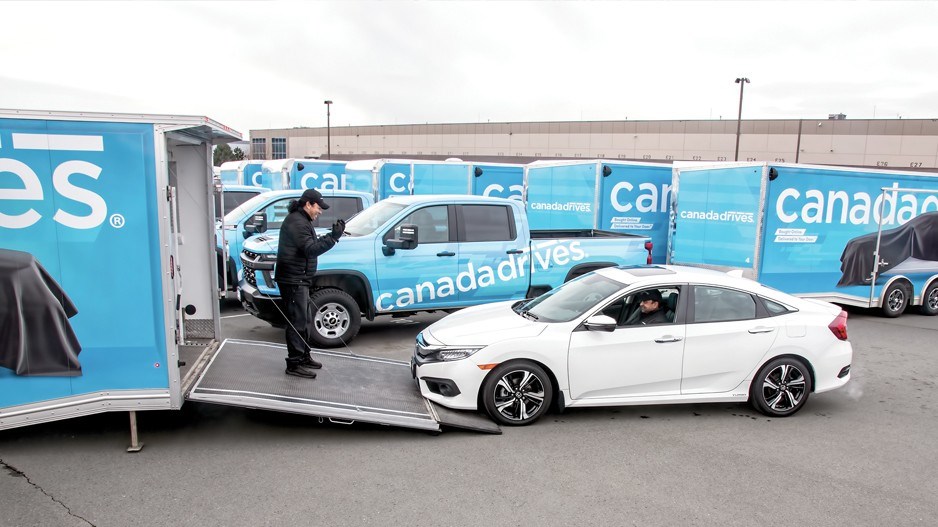There’s no question about the main culprit driving trends in auto sales in Canada this past year, according Al-Karim Awadia.
“The supply chain disruption over the last year was at the heart of the biggest shifts we've noticed,” said the head of the automotive industry for Google Canada.
“The really important question is whether the shifts in consumer behaviour and expectations have now fundamentally shifted.”
Like the rest of the consumer economy during the course of the pandemic, Google Canada data shows the auto industry has not been immune to the influence of e-commerce since the onset of COVID-19.
Online sales accounted for fewer than one per cent of new car sales in Canada prior to the pandemic. They now make up six per cent – a more than 600 per cent jump, according to the Google Gearshift 2022 study.
“Customers’ willingness to purchase online is really fascinating to watch as online transactions for almost all products become the norm,” Awadia said.
B.C. tech companies have been drawing a bead on the expanding market for online auto sales since the start of the pandemic.
Last month Vancouver-based Canada Drives Ltd. received a $10-million capital injection from investorsfollowing a $40-million raise this past June and a $100-million raise last year.
The company got its start helping consumers secure financing for auto purchases before launching its online sales platform in 2020. Customers can browse through an inventory of used cars, and then purchase a vehicle delivered in a trailer within a day of the sale.
Last month the company said sales have grown 83 per cent year over year. Its market reach extends into B.C., Alberta, Saskatchewan and Ontario.
Vancouver’s Autozen Technology Ltd. also announced in June it closed a seed round totalling more than $5 million for its platform that targets both drivers and dealers.
Users looking to sell can plug in their vehicle’s make, model and year. Autozen’s platform responds with a range of prices for how much the automobile will likely fetch from dealers looking to acquire vehicles.
The platform is free for consumers to use, while Autozen charges a commission to dealers for every vehicle sold.
The company previously raised $4.2 million in early 2021 and now plans to expand beyond the Vancouver market and into Toronto, Calgary, Edmonton and Seattle.
“It's interesting that a lot of it is started in Vancouver and I think that speaks volumes to the Vancouver tech scene,” Mike Wood, CEO of online auto sales platform TrafficDriven Technologies Inc. (dba Mintlist), told BIV in July.
“It's a fairly new frontier, which is why I think you see all these new players entering the market. And we're all doing it from a different vantage point and doing it a little bit differently. And I firmly believe there is room for a JJ Bean [Inc.] and a Starbucks [Corp. (Nasdaq:SBUX)] being on opposite corners.”
His West Coast company aggregates inventory among dealers it’s partnered with across the province for access to thousands of vehicles. Dealers are charged a fee to access the program as well as a one per cent fee every time they buy or sell a car using the platform.
Consumers can also use the platform to auction off their cars (each vehicle must go through a 13-point basic inspection using the owner’s smartphone) and decide whether or not to accept the high bid after the end of the auction.
Meanwhile, Google Canada’s data also shows specific splinters within the broader market for vehicles, especially when B.C. is compared with other provinces.
Citing a July 2022 Bloomberg analysis, Awadia said the tipping point for when electric vehicles (EV) go from niche to mainstream is when the market for sales hits five per cent.
By that standard, Google Canada’s data indicates B.C. has far exceeded that tipping point with nearly 16 per cent of car sales in the province now going to EVs compared with six per cent in Ontario.
“That’s a considerable difference,” Awadia said.
“The trend of having incentives in place for a longer duration with kind of a provincial legislature that has always been focused on being more environmentally friendly in B.C., I think there is definitely a demographic difference that I've noticed on the West Coast of people and their desire to be more environmentally friendly, and the continuity of EVs and EV incentives has definitely played a role.”
At the start of the year, the B.C. government was offering rebates of up to $3,000 for plug-in electric car purchases and $1,500 for plug-in hybrids.
But the province kicked off August by boosting rebates up to $1,000 for zero-emissions vehicles (ZEV). The heightened effort to encourage ZEV purchases comes as both the province and Ottawa have mandated 100 per cent of new passenger vehicle sales to be ZEVs by 2035.
In addition to incentives, Awadia said “it's probably a continuity of messaging that is taking place by the provincial government in B.C. to move towards EVs, not too dissimilar from what we see between the east in the U.S. vs. California and their legislature, and their move towards more environmentally friendly vehicles.”




